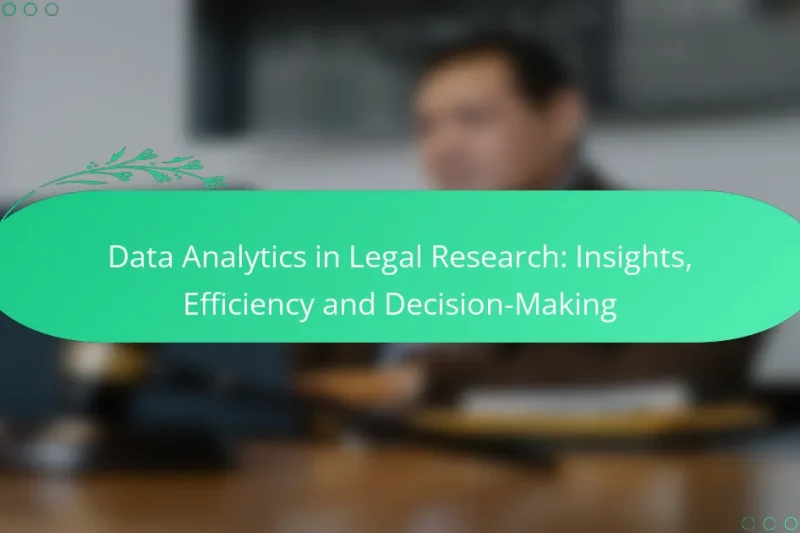Adapting legal research to regulations is essential for ensuring compliance in a dynamic legal environment. By … Adapting Legal Research to Regulations: Compliance, Strategies and ToolsRead more
Legal Research Trends
The landscape of legal research in the UK is evolving rapidly, driven by technological advancements that improve both efficiency and accessibility. Innovations such as artificial intelligence, data analytics, and blockchain technology are reshaping how legal professionals conduct research, allowing them to focus more on strategic decision-making and client engagement.
Emerging Trends in Legal Research: Intellectual Property, Compliance and Innovation
Emerging trends in legal research are reshaping the landscape of intellectual property, compliance, and innovation. The … Emerging Trends in Legal Research: Intellectual Property, Compliance and InnovationRead more
Data Analytics in Legal Research: Insights, Efficiency and Decision-Making
Data analytics is revolutionizing legal research by offering tools that enhance efficiency, accuracy, and decision-making. By … Data Analytics in Legal Research: Insights, Efficiency and Decision-MakingRead more
Future of Legal Research: Predictions, Innovations and Challenges
The future of legal research is poised for transformation through technological advancements such as artificial intelligence, … Future of Legal Research: Predictions, Innovations and ChallengesRead more
Technology’s Impact on Legal Research: Practices, Tools and Efficiency
Technology is revolutionizing legal research by providing legal professionals in the UK with faster access to … Technology’s Impact on Legal Research: Practices, Tools and EfficiencyRead more
Remote Work’s Influence on Legal Research: Collaboration, Access and Flexibility
Remote work has transformed the landscape of legal research by fostering enhanced collaboration, access to resources, … Remote Work’s Influence on Legal Research: Collaboration, Access and FlexibilityRead more
Trends in Legal Research Education: Curriculum, Skills and Technology
In the UK, legal research education is evolving to incorporate technology, enhance practical skills, and embrace … Trends in Legal Research Education: Curriculum, Skills and TechnologyRead more
What are the latest legal research trends in the UK?
The latest legal research trends in the UK highlight a shift towards technology-driven solutions that enhance efficiency and accessibility. Key developments include the integration of artificial intelligence, data analytics, remote access capabilities, blockchain technology, and a rise in legal tech startups.
Increased use of AI tools
AI tools are revolutionizing legal research by automating routine tasks and providing advanced analytical capabilities. These tools can quickly sift through vast amounts of legal documents, case law, and statutes, significantly reducing research time from hours to minutes.
Law firms in the UK are increasingly adopting AI platforms for tasks such as contract analysis and predictive analytics, which can forecast case outcomes based on historical data. This trend not only improves accuracy but also allows legal professionals to focus on more strategic tasks.
Focus on data analytics
Data analytics is becoming essential in legal research, enabling firms to derive insights from large datasets. By analyzing trends in case law and client behavior, legal professionals can make informed decisions that enhance their practice.
For example, firms can use analytics to identify which types of cases are more likely to succeed in specific jurisdictions, allowing them to tailor their strategies accordingly. This data-driven approach is increasingly seen as a competitive advantage in the legal market.
Emphasis on remote access
The shift towards remote access has transformed how legal research is conducted. With the rise of cloud-based platforms, legal professionals can access resources and collaborate with colleagues from anywhere, facilitating a more flexible work environment.
This trend has been accelerated by the COVID-19 pandemic, which highlighted the need for robust remote solutions. Law firms are now prioritizing secure access to databases and research tools to ensure continuity and efficiency in their operations.
Integration of blockchain technology
Blockchain technology is gaining traction in legal research as it offers enhanced security and transparency. This technology can be used to create immutable records of legal documents, ensuring authenticity and reducing the risk of fraud.
In the UK, some firms are exploring blockchain for smart contracts, which automatically execute terms when conditions are met. This innovation streamlines processes and minimizes disputes, making it an attractive option for modern legal practices.
Growth of legal tech startups
The legal tech startup ecosystem in the UK is flourishing, with numerous companies emerging to address specific legal challenges. These startups are developing innovative solutions that range from document automation to client management systems.
Investors are increasingly interested in this sector, recognizing the potential for technology to disrupt traditional legal practices. As these startups grow, they are likely to drive further advancements in legal research methodologies and tools.
How is AI transforming legal research?
AI is significantly transforming legal research by automating complex tasks, enhancing efficiency, and providing deeper insights into case law. These advancements allow legal professionals to focus on strategy and client interaction rather than time-consuming research processes.
Enhanced efficiency in case law analysis
AI tools streamline case law analysis by quickly sifting through vast databases to identify relevant precedents. This reduces the time spent on manual searches, allowing lawyers to access pertinent information in a matter of minutes instead of hours.
For example, AI-powered platforms can analyze case outcomes based on similar fact patterns, helping attorneys to build stronger arguments. By leveraging these technologies, legal teams can increase their productivity and improve the quality of their work.
Automated document review processes
Automated document review processes utilize AI to examine legal documents for relevance and compliance, significantly speeding up the review phase. These systems can flag important clauses, inconsistencies, or potential issues, reducing the risk of human error.
Law firms can save substantial amounts of time and resources by implementing AI-driven document review tools, which can handle thousands of documents in a fraction of the time it would take a human reviewer. This efficiency is particularly beneficial during discovery phases in litigation.
Improved predictive analytics for case outcomes
AI enhances predictive analytics by analyzing historical case data to forecast potential outcomes. This capability allows legal professionals to make informed decisions about whether to pursue a case or settle based on likely results.
By using AI tools that provide insights into trends and patterns, attorneys can better strategize their approach. For instance, understanding how similar cases have been resolved can guide negotiations and litigation strategies, ultimately improving success rates.
What are the benefits of data analytics in legal research?
Data analytics in legal research offers significant advantages, including enhanced understanding of legal trends and improved decision-making for law firms. By leveraging data, legal professionals can identify patterns and insights that inform their strategies and case selections.
Better insights into legal trends
Data analytics provides law firms with the ability to analyze vast amounts of legal data, uncovering trends that may not be immediately apparent. For instance, firms can track the frequency of certain case types or outcomes over time, allowing them to adjust their practices accordingly.
Utilizing tools that aggregate and analyze case law, statutes, and judicial decisions can reveal shifts in legal interpretations or emerging areas of law. This proactive approach enables firms to stay ahead of changes in the legal landscape.
Informed decision-making for law firms
With data analytics, law firms can make more informed decisions regarding case strategies, resource allocation, and client engagement. By understanding which types of cases yield higher success rates or require more resources, firms can optimize their operations.
For example, analytics can help determine the most effective legal arguments based on historical data, enabling attorneys to craft stronger cases. This data-driven approach can lead to increased efficiency and better client outcomes.
Identification of high-value cases
Data analytics assists in pinpointing high-value cases that are likely to yield favorable outcomes or significant financial returns. By analyzing past case results and client profiles, firms can identify which cases align with their strengths and market opportunities.
Additionally, using predictive analytics can help assess the potential value of a case before committing extensive resources. This strategic identification process allows firms to focus on cases that maximize their chances for success and profitability.
How can law firms adapt to remote legal research?
Law firms can adapt to remote legal research by leveraging technology, enhancing communication, and providing training for their staff. Embracing cloud-based tools, secure platforms, and best practices ensures efficiency and compliance in a remote environment.
Utilization of cloud-based research tools
Cloud-based research tools allow legal professionals to access vast databases and resources from anywhere, facilitating collaboration and real-time updates. Popular platforms like Westlaw and LexisNexis offer comprehensive legal research capabilities that can be accessed remotely.
When selecting cloud-based tools, consider factors such as user-friendliness, integration with existing systems, and cost. Subscription fees can vary widely, so firms should evaluate their budget against the features offered.
Implementation of secure communication platforms
Secure communication platforms are vital for maintaining client confidentiality and compliance with legal standards. Tools like Microsoft Teams and Slack provide encrypted messaging and video conferencing options that are essential for remote collaboration.
Firms should ensure that all communication tools comply with relevant regulations, such as the GDPR in Europe or HIPAA in the United States. Regularly updating security protocols and conducting staff training on data protection can mitigate risks associated with remote communication.
Training staff on remote research best practices
Training staff on remote research best practices enhances efficiency and accuracy in legal research. Regular workshops and online training sessions can cover topics like effective search techniques, evaluating sources, and using digital tools proficiently.
Firms should create a resource library with guides and tutorials to support ongoing learning. Encouraging a culture of continuous improvement can help staff adapt to evolving research methodologies and technologies.
What role does blockchain play in legal research?
Blockchain technology enhances legal research by providing secure, transparent, and immutable records of legal documents and transactions. Its decentralized nature ensures that data integrity is maintained, making it easier for legal professionals to verify and access important information.
Secure storage of legal documents
Blockchain offers a robust solution for the secure storage of legal documents. By utilizing cryptographic techniques, it ensures that documents are tamper-proof and can only be accessed by authorized parties. This reduces the risk of data breaches and unauthorized alterations, which are critical concerns in legal environments.
For example, law firms can store contracts, case files, and evidence on a blockchain, allowing for easy retrieval while maintaining a clear audit trail. This method not only enhances security but also streamlines document management processes.
Verification of legal transactions
Blockchain facilitates the verification of legal transactions by providing a transparent ledger that records every transaction in real-time. This feature allows legal professionals to confirm the authenticity of agreements and transactions without relying on intermediaries, which can introduce delays and potential errors.
For instance, smart contracts on a blockchain can automatically execute transactions when predefined conditions are met, ensuring compliance and reducing the likelihood of disputes. Legal practitioners can leverage this technology to enhance trust and efficiency in their dealings.






